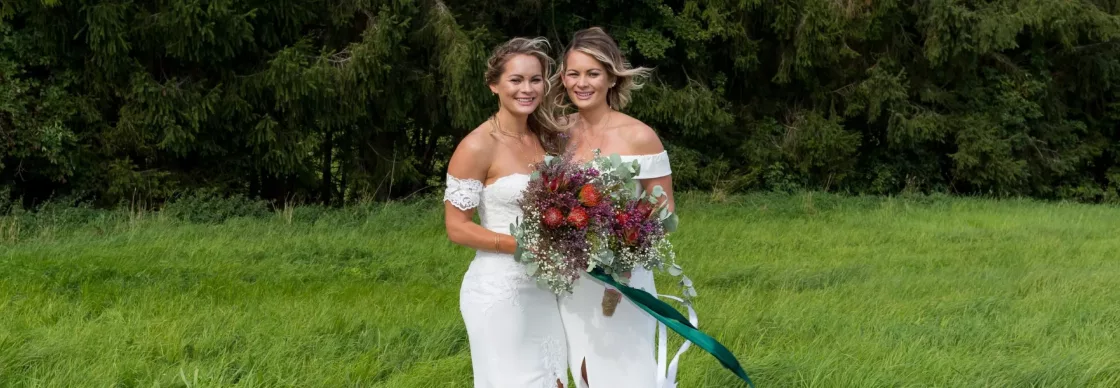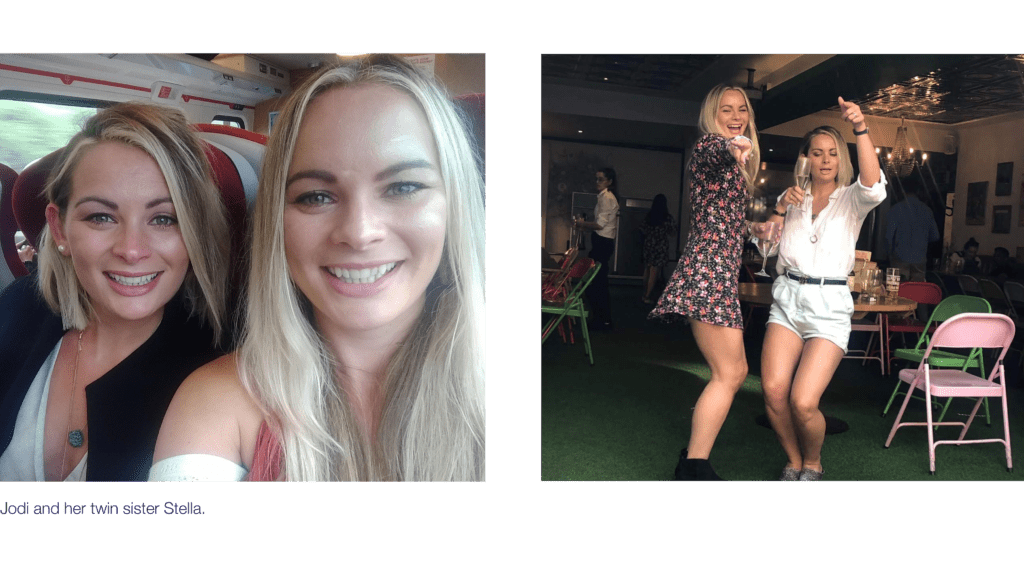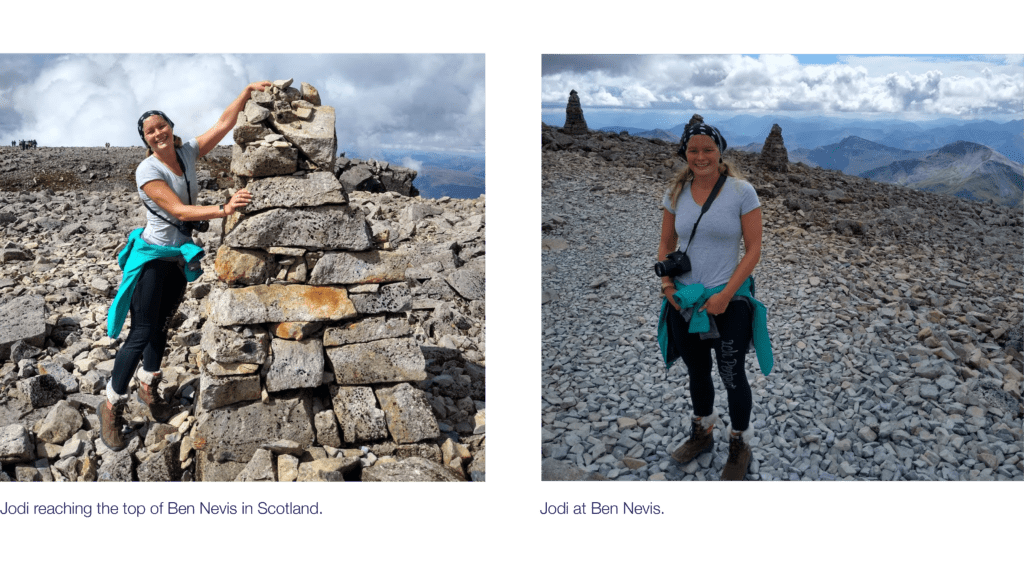
After her identical twin sister was diagnosed with breast cancer aged 29, Jodi was shocked to be told she also had breast cancer two years later, despite having no genetic link. Jodi chatted to us about her frustrations after being diagnosed when she felt her fittest and healthiest, and how she found comfort knowing that her twin sister had already dealt with treatment.
One morning I woke up (still half asleep) and thought, ‘I don’t think I’ve checked my boobs in a while’ and so I did it there and then, lying in bed. It’s the strangest thing that I thought to check – it’s like I subconsciously knew. That’s when I found the lump. I was 31 and my twin sister had been diagnosed with breast cancer two years earlier when we were 29. We had no family history of cancer so we didn’t know a lot about it until she was diagnosed. We’re identical twins, so we were concerned about my risk and I had been vigilant with checking my chest ever since. We had a few common gene tests which we tested negative for and I was deemed a low risk because of the results and our family history.
When I found my lump in bed, I asked my husband to feel it to see what he thought – it was a definite lump. One of our friends found a lump in her breast which turned out to be a cyst, so I had in my head that this must also be a cyst. I thought, ‘surely my lump isn’t breast cancer’, but after what my sister had been through, I thought I had better get it checked by a doctor. I rang the GP as soon as they opened and got an appointment that same afternoon. The GP told me that because of my age they would usually wait a while, but given my sister’s history, they referred me to the breast clinic. They acted really quickly which was great. Within two weeks of finding the lump I was also diagnosed with breast cancer.
To be honest, before my sister and I were diagnosed, I wasn’t aware that breast cancer could affect young people. We’d always heard about breast cancer in pre-menopausal women and thought that it was something that affected older people. We knew there was always a risk, but didn’t think it was very common.
Both my sister and I were the youngest at the hospital when we went for our appointments – people used to ask how old we were because we looked so much younger than everyone else.

I was diagnosed during the pandemic and I feel so lucky that my hospital managed it so well. I’ve heard of all the people who haven’t been able to receive cancer treatment during this time. You weren’t allowed to bring anyone to the hospital with you, which made it harder, but all the staff were amazing. It was more stressful dealing with the thought that if I got Covid-19 I could become really ill. Chemo was by far the worst part of treatment for me and it was a mental and physical challenge at times. I took a bit of comfort knowing what to expect as I had watched my sister go through the same thing before.
In a sense, however sad it sounds, it was almost comforting that my sister had been through it – I knew what to expect and I saw her deal with the treatment and be okay. Sometimes we have to laugh that we’re even having these conversations, but it’s nice that we can check how we both felt going through things.
I had a mastectomy after chemo and they’ve tested all the tissue. There’s now no trace of breast cancer which is a relief. My sister has had her routine check up and has had the all clear as well.
Doctors are really interested in our case. Both my sister and I tested negative to having the BRCA gene and other tests too. The doctors think that something is acting similarly to the BRCA gene, but as we don’t have it, it could be something new that they can’t yet test for. It could be something genetic, but they can’t test for it at the moment and haven’t really come across it before.
When I was diagnosed, I felt the healthiest and fittest I had ever felt. I was so angry that I had looked after myself and it had still happened to me. As we had had all the genetics testing, it was shocking to find out that breast cancer could still happen, even though my chances were slim.
I tried to remain positive throughout my experience as I knew if I let myself dwell on it, it could feel like a bigger hill to climb. I am a trained fitness instructor and personal trainer so I wanted to keep active throughout my treatment. I set up a page on Instagram to share my journey and hopefully inspire others to keep active through treatment for mental and physical stamina. I really struggled when the treatment was making me feel out of breath. Sometimes I couldn’t run for five minutes without being out of breath and it frustrated me. My joints used to ache and I really felt the effects of chemo, but I was so determined to keep some normality. I climbed Ben Nevis after four chemo sessions. I had always wanted to do it, so whilst we were on a road trip around Scotland, I decided to do it. It was the hardest thing I’ve ever done because of the chemotherapy side effects. My breathing was so short and I couldn’t take deep breaths but it felt so good when we got to the top! I just saw so many people walking up, even kids, and thought, ‘you have to do it!’ You have to be determined, you can keep going if you have the right mentality. Fitness has always been a part of me and I didn’t want my treatment to stop me doing what I love.

Since I have been diagnosed I have made some changes to my life which I wanted to do for so long. The main thing being working part time so I can focus more on myself and take time to think about what I want to do with my future. One piece of advice I would give to my younger self is not to worry as much about silly things like work and things out of my control.
My advice for other people is: don’t ever hesitate to get something checked out, even if you think it’s nothing to worry about. It’s so important to go to your doctor – it could be the biggest thing you ever do.
Set a reminder each month to check your boobs – that’s what I did and that’s how I found my lump.You don’t really know what a lump feels like until you feel it. As scary as it can be if you find anything, having that conversation with your doctor is so important, as it could be something.